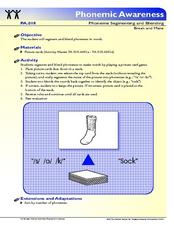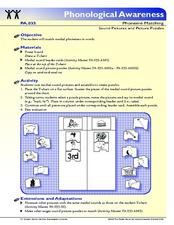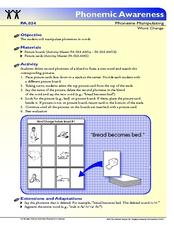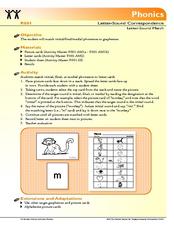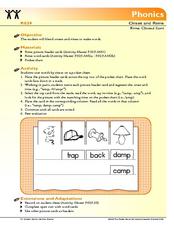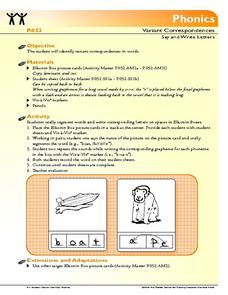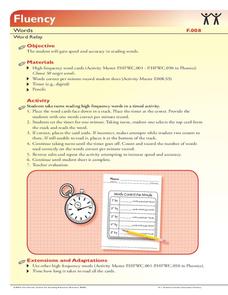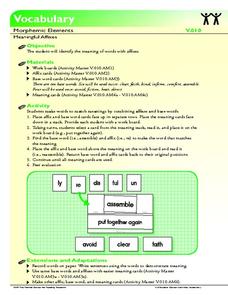Florida Center for Reading Research
Phonemic Awareness: Phoneme Segmenting and Blending, Break and Make
Young learners build phonemic awareness and strong phoneme blending skills. Pairs guess the image on the card based on the word segment sounds given by blending what they hear.
Florida Center for Reading Research
Phonemic Awareness: Phoneme Matching, Sound Pictures and Picture Puzzles
Scholars use a T-chart and puzzle pieces to practice saying and recognizing the medial sound in a series of words. Peers take turns choosing a puzzle piece, saying its name and medial sound, then placing it on their side of the chart.
Florida Center for Reading Research
Phonological Awareness: Phoneme Matching, Final Phoneme Memory
Try to match the final sounds in this memory game! Learners place all 24 cards upside down and take turns flipping them to see if the final phonemes match. If they do, remove them; if not, put them back. Partners play until all cards...
Florida Center for Reading Research
Phonological Awareness: Phoneme Matching, Medial Match
Early readers get together and match medial phonemes. They take turns picking picture cards from a pile; they say each word, then determine whether the pair has matching medial sounds.
Florida Center for Reading Research
Phonological Awareness: Phoneme Manipulating, Word Change
Once your scholars know their letter sounds and recognize them in words, have them try making new words by manipulating phonemes. Pupils are given a word change picture board and a stack of word pictures. They pick a card and place it...
Florida Center for Reading Research
Drop and Say
This neat idea gets kids to use phonics and puzzle-solving skills. Pairs take turns picking picture cards from a pile, say the name of the object on the card, drop a letter to turn that word into a new word, then look for the new word on...
Florida Center for Reading Research
Phonics: Letter-Sound Correspondence, Letter Sound Match
Scholars match initial, medial, and final phonemes to individual graphemes. They pick a card, say its name, then find the letter that makes that sound. If the card is a monkey, the learner finds the letter m, matching the grapheme to the...
Florida Center for Reading Research
Phonics: Onset and Rime, Rime Closed Sort
Practice onset and rime with this word sort activity. Beginning readers lay out the four picture cards along the top of the chart: fan, cap, tack, and lamp. Then, they flip word cards and sort them beneath the image with the same rime....
Florida Center for Reading Research
Phonics: Onset and Rime, Word Maker Game
Scholars use a set of onset and rime cards to construct and write various simple words. Pairs take turns pulling cards from a bag and blending the onset card with the rime card to create a word. They record the onset, the rime, and the...
Florida Center for Reading Research
Phonics: Encoding and Decoding, A Digraph A Word
Learners view a series of images, then choose digraphs, consonants, and vowels to spell out the object's name on each card.
Florida Center for Reading Research
Phonics: Variant Correspondences, Say and Write Letters
Scholars sound out and write twelve different words. Using Elkonin boxes, pupils say the name of each picture, then write the letters that make each sound.
Florida Center for Reading Research
Phonics: High Frequency Words, Sand Paper Words
Learners use a stack of words embellished with tactile elements, such as sandpaper, to practice high-frequency words. Pupils trace the tactile surface of each letter in the word, write it on their paper, then find and glue that word from...
Florida Center for Reading Research
Fluency: Words, Word Relay
Peers take turns timing each other for one minute and reading as many high-frequency cards as possible.
Florida Center for Reading Research
Fluency: Words, Fast Match
Here is an interesting take on the old timed-fluency activity. In pairs, learners work together to see how fast they can read two sets of high-frequency words. Peer one reads a word from his list; peer two works fast to find that word in...
Florida Center for Reading Research
Vocabulary: Morphic Elements, Compound Word Trivia
Engage young learners in expanding their vocabulary with a fun game. Scholars learn how compound words provide clues about the meaning of unfamiliar vocabulary. Pairs take turns reading a definition, locating its corresponding compound...
Florida Center for Reading Research
Vocabulary: Word Meaning, Undercover Meanings
Support young scholars with studying new vocabulary using this foldable resource. By cutting and folding the included template, learners can record definitions, examples, and a sentence for four different words.
Florida Center for Reading Research
Vocabulary: Morphemic Elements, Root-A-Word
In pairs, scholars draw cards, read the word, and identify its root. Learners place the card on a tree-themed worksheet to sort words by their roots.
San Diego Unified School District
On-Demand Persuasive Writing Samples
Young writers complete a timed persuasive writing assignment in which they argue for a club they would like to see established at school, and are then provided with real student samples of responses.
Florida Center for Reading Research
Comprehension: Monitoring for Understanding, Simple Summary
Can your class sum up a text in a few sentences? Help them build this skill by starting nice and slow. For this summarizing activity, the teacher marks the main ideas with sticky notes. Learners read and reread the text, pausing at the...
Florida Center for Reading Research
Fluency, Letter-Sound Correspondence, Make a Match
An activity tests the fluency skills of young readers. Scholars match initial sound cards to letter cards. Pairs take turns and work to locate the most matches before the timer goes off. The activity ends with a peer evaluation.
Florida Center for Reading Research
Fact Versus Opinion
Is that a fact or an opinion? Learners explore the difference using this pocket chart activity during which partners read statement cards and determine whether they are facts or opinions.
Ohio National Guard
Emotional Intelligence
Provide teenagers with the social skills they need to live happy lives with this collection of worksheets and activities. Covering a variety of topics from self-awareness and assertiveness, to stress management and problem solving, this...
Florida Center for Reading Research
Vocabulary: Morphemic Elements, Meaningful Affixes
Invite learners to determine which affix and base word combinations create new words. This activity allows pupils to play around and create words that match specific meanings.
Curated OER
Nonfiction Genre Mini-Unit: Persuasive Writing
Should primary graders have their own computers? Should animals be kept in captivity? Young writers learn how to develop and support a claim in this short unit on persuasive writing.
Other popular searches
- Sentence Revisions
- Writing Revisions
- Polish English Revisions
- Making Revisions
- Short Story Revisions
- Punctuation Revisions
- Rainbow Revisions
- Revisions Methods
- Peer Revisions
- Making Revisions in Writing
- Writing Revisions Methods
- Rainboe Revisions


